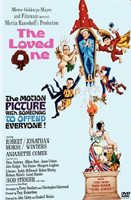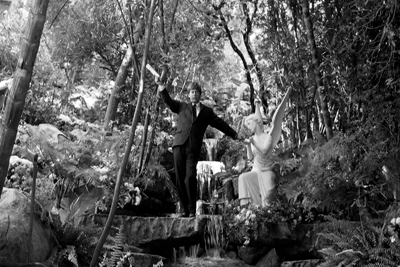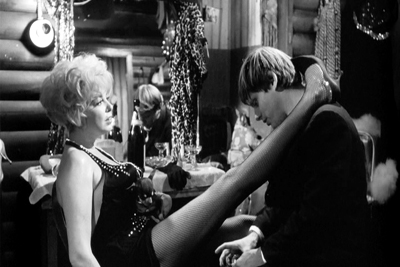 BUY IT AT AMAZON: CLICK HERE!
BUY IT AT AMAZON: CLICK HERE!
STUDIO: Warner Bros. Home Entertainment
MSRP: $19.98
RATED: NR
RUNNING TIME: 121 Minutes
SPECIAL FEATURES: "Trying to Offend Everyone" featurette
The Pitch
"It’s The Player meets Six Feet Under!"
The Humans
A cornucopia! Robert Morse, Jonathan Winters, Milton Berle, John Gielgud, Roddy McDowall, and Rod Steiger.
The Nutshell
A young English man is awarded a free flight by way of being the ten-millionth person to see someone away at the airport. The airline gives him a choice between Calcutta and Los Angeles, and he chooses the City of Angels. Upon arriving, he seeks out an uncle who works at a movie studio, intending to mooch off of him for a while. But when his uncle takes a long walk off a short diving board, our very British hero finds himself caught up in an entirely unexpected branch of life: that of caring for the dead.
 Witness the clash of cultures between West and Further West.
Witness the clash of cultures between West and Further West.
The Lowdown
The Loved One bills itself as a "motion picture with something to offend everyone!" Naturally, it’s a comedy, but with Tony Richardson at the helm, it’s one with something of a unique sensibility. Richardson was a man who had more than a passing acquaintance with tragic entertainment. His first directorial project was Shakespeare’s Othello for TV, and the years surrounding The Loved One contain such light-hearted work as an adaptation of Faulkner’s Sanctuary, The Charge of the Light Brigade, and Look Back in Anger.
As a result, The Loved One is a comedy that takes to heart the truism that it’s tragedy if it happens to me, but it’s comedy if it happens to you — the "me" in this case being the audience, and the "you" being all the many poor saps that populate the film.
Where better to find poor saps than Hollywood? The film kicks off with a half-hour or so of satire of insider politics in a major studio, the highlights of which are backbiting, termination-without-cause, and the film’s central suicide. I know that doesn’t immediately sound like a funny way to open a movie, but it sets the tone fairly well for the remainder. Richardson’s plan of attack — thanks to a story from Evelyn Waugh — was to take these minor tragedies and play them so broadly, so deadpan they become self-reflexive. It’s the old funhouse mirror trick, and though audiences today have already seen most of the twisted images that result, it’s internally coherent enough to maintain its humor.
It starts with lampooning Hollywood, but it goes much further than that. After all, its goal is to offend everyone. So, it’s got to find some common ground, something that everyone goes through… Death! Ah, sweet death. After the Hollywood segment, the running time is primarily focused on our erstwhile protagonist’s visit, and return visits, to a particular high-class funeral home and cemetery. The film hits its stride here, branching out its cynicism into the areas of love, God, motherhood, literature, corporate America, organized religion, amateur rocketry, and the working class.
 "Stand still, Mr. Morse. Your manicure is almost finished."
"Stand still, Mr. Morse. Your manicure is almost finished."
That’s a lot of ground to cover, and unfortunately for Richardson he didn’t have much of a plot to string it all together. The protagonist, played by Robert Morse, is unlikable and aimless. For about half of the film, he doesn’t have a clear goal in mind, which, even with the momentum of the craziness, causes the audience interest to wane. For the other half, his goal is to bed a young cosmetologist who works at the funeral home. At that point, the film enters love triangle mode, with the third point being Rod Steiger’s Mr. Joyboy, a mom-obsessed man-child who is the head embalmer at the home.
With a love triangle, there’s at least the semblance of plot, but except for at points of conflict when all three come together, it’s not very compelling, and not very functional an engine. Instead, the film meanders from criticism to criticism, with varying degrees of success. In a way, it’s almost a precursor to the Hot Shots vein of zaniness. There’s no plot of importance, no character to like, just strings of loosely-connected satire by way of slavish devotion to convention.
The density of talent in The Loved One is a saving grace, inasmuch as that’s needed, but it’s plain that Richardson was more comfortable with unabashed tragedy. This is a deeply flawed movie, but I have to add that it may well be worth viewing just to see Robert Morse compose an earnest ode on his suicide uncle.
 Are you offended yet?
Are you offended yet?
The Package
There’s one featurette for your viewing pleasure, and it’s actually an interesting one. It’s called "Trying to Offend Everyone," ad is something of a making-of piece with that stated goal as a starting point. It’s a welcome bonus, mostly because it’s fascinating to observe how culture shifts so smoothly in where it finds offense.
The audio and video are of decent quality, but nothing to write home about on either end of the spectrum.
6.5 out of 10
 BUY IT AT AMAZON: CLICK HERE!
BUY IT AT AMAZON: CLICK HERE!

